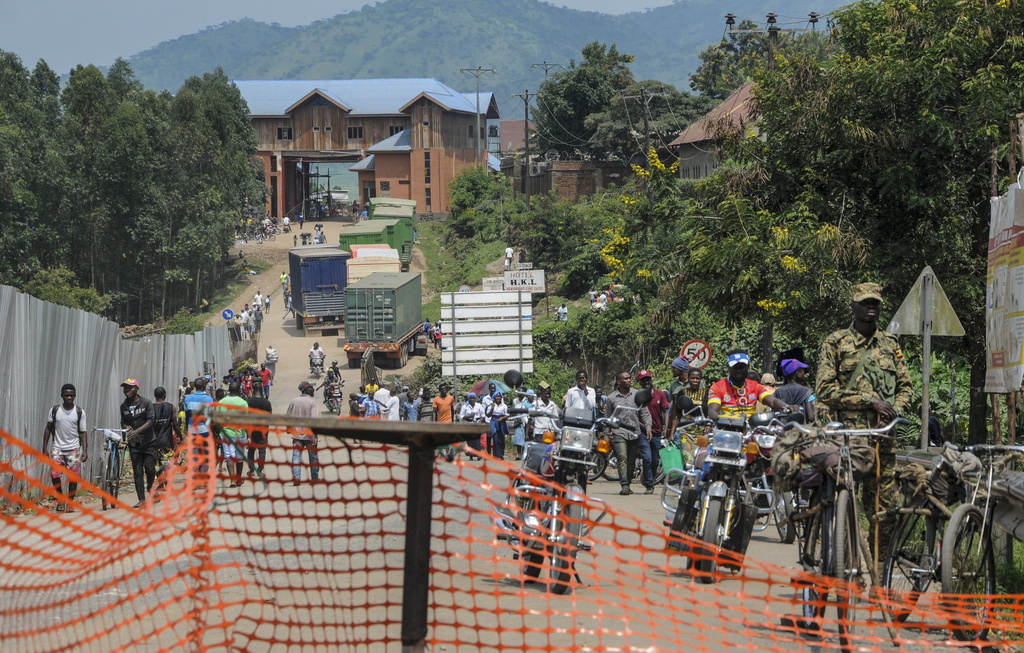ADF STAFF
The attack on Lhubiriha Secondary School in Mpondwe, Uganda, began late at night on Friday, June 16, and spilled into the early morning hours.
Among the 42 dead were 20 girls who were executed with machetes as they fled. Seventeen boys resisted and were locked in their dormitory.
“This terrorist group couldn’t enter, so they threw in a bomb, they threw in a petrol bomb,” Uganda’s Education Minister and first lady Janet Museveni said in a statement.
They were burned beyond recognition.
Fighters from the Allied Democratic Forces, an Islamic State group affiliate, crossed the border from the Democratic Republic of the Congo (DRC) and reportedly spent two days in Mpondwe considering targets before choosing the school.
The attack underlined the danger facing DRC-Uganda border communities, which also are vulnerable to recruitment by militant groups.
“The attack was well planned as each of the 10 terrorists entered the country individually and not as a group,” Uganda’s Minister of Defense and Veteran Affairs Vincent Bamulangaki Ssempijja said to Parliament.
Historically, students have been attacked because schools are considered soft targets. Children are recruited by rebels or kidnapped and used as porters of food and supplies. Attacks on schoolchildren also provide desired media coverage.
Porous borders often are a blind spot for security forces. Mpondwe, the busiest of three Ugandan border crossings with the DRC, has multiple footpaths not monitored by authorities.
Large swaths of eastern DRC are lawless, allowing groups such as the Allied Democratic Forces to operate with impunity. The federal government, based more than 2,000 kilometers away in the DRC’s capital, Kinshasa, has limited authority.
In Uganda, militant groups exploit a number of factors: an influx of refugees from eastern DRC, high unemployment rates, and the unregulated movement of people and goods.
Muhsin Kaduyu, a Kampala-based terrorism prevention expert, said that despite the millions of dollars in cross-border trade in this region, individuals who voluntarily join armed groups mostly do so for economic reasons.
“Structural challenges that highlight a growing sense of social exclusion, marginalization or injustice make communities more vulnerable to radicalization,” he told the South Africa-based Institute for Security Studies (ISS).
Geoffrey Ngiriker, mayor of Nebbi municipality in northwest Uganda, said young people in his community and other border areas frequently cross into the DRC for jobs. On arrival, they are coerced into joining militant groups.
When these groups fail to get enough voluntary recruits, they use violence to fill their ranks.
Ugandan President Yoweri Museveni vowed to deploy more troops on the Ugandan side of the border.
The African Centre for the Study and Research on Terrorism similarly called for an increased security presence. But in analyzing the attack, it reached a blunt conclusion: “The fact that the terrorists spent two nights undetected while engaging locals indicates extreme lack of community awareness resulting from inadequate community engagement in the fight against terrorism and violent extremism.
“Uganda needs to embark on a strategy of community engagement in border communities as a critical component of an effective counterterrorism approach.”
In 2021, Ugandan forces deployed to the eastern DRC in a joint military operation called Shujaa, which used overwhelming force on the ground and through the air to destroy several of the Allied Democratic Forces’ hideouts in the dense forests of North Kivu province.
Kaduyu believes the school attack could have been in response to Operation Shujaa, as the militant group suffered heavy losses and has resorted to guerrilla tactics against vulnerable targets.
According to Uganda’s Operation Shujaa commander Maj. Gen. Dick Olum, when Allied Democratic Forces fighters are under pressure they typically “divert” the attention of security forces by splitting into small groups to launch violent attacks in other places.
Ngiriker stressed the need for trust and confidence between local communities and security forces. He also said Uganda must improve the capacity of law enforcement and government offices to deal with the root causes of violent extremism.
ISS researcher Isel Ras believes the government can do more.
“Information sharing must be improved, and financial and technical support could be offered to local programs to alleviate the drivers of insecurity,” he wrote in a July 4 post on the ISS website.
Kaduyu said border communities need help to better understand and identify the security challenges they are facing.
“The more aware they are, the more agency they have to be resilient against the threats,” he said.

